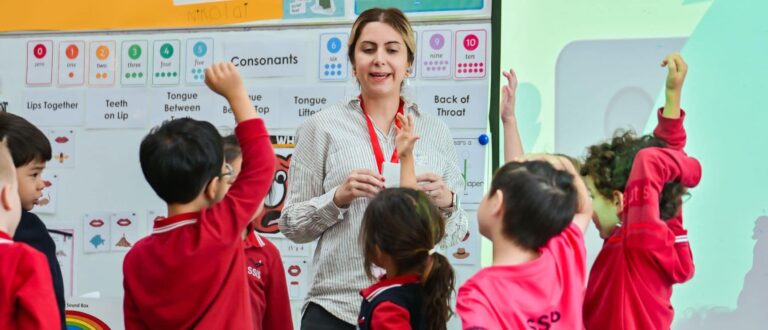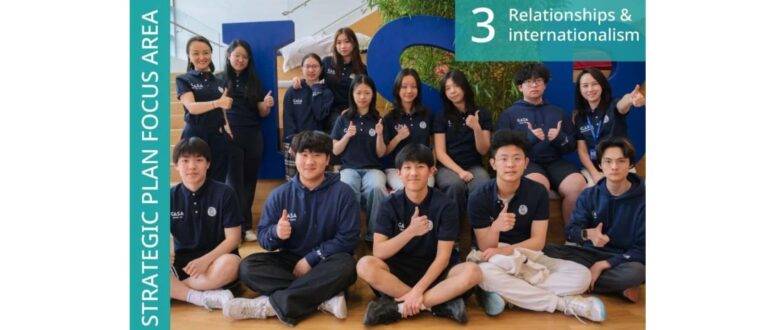Almost four days have passed and Cady Feng has emerged from her room, at last with a draft of an essay about The God of Small Things, ready for review. Her dad is there, happy to see his daughter finally finishing the paper that they have talked about since the summer holiday. It will be Cady’s Extended Essay (EE) for her IB Diploma Programme.
It is an unconventional choice—and a challenging one. Teachers and peers who know Cady well assumed she would go for a topic closely related to physics or chemistry, or to her academic special interests. But something in the novel has excited Cady, propelling her to a challenge that will soon reward her in many ways.
A lot of people at Keystone Academy unfairly think of or refer to Cady as a xueba—an academic overachiever by Chinese standards. But more than her academic brilliance, it is her incredible balancing act across curricular activities and personal interests that has dazzled and inspired her teachers and classmates alike.
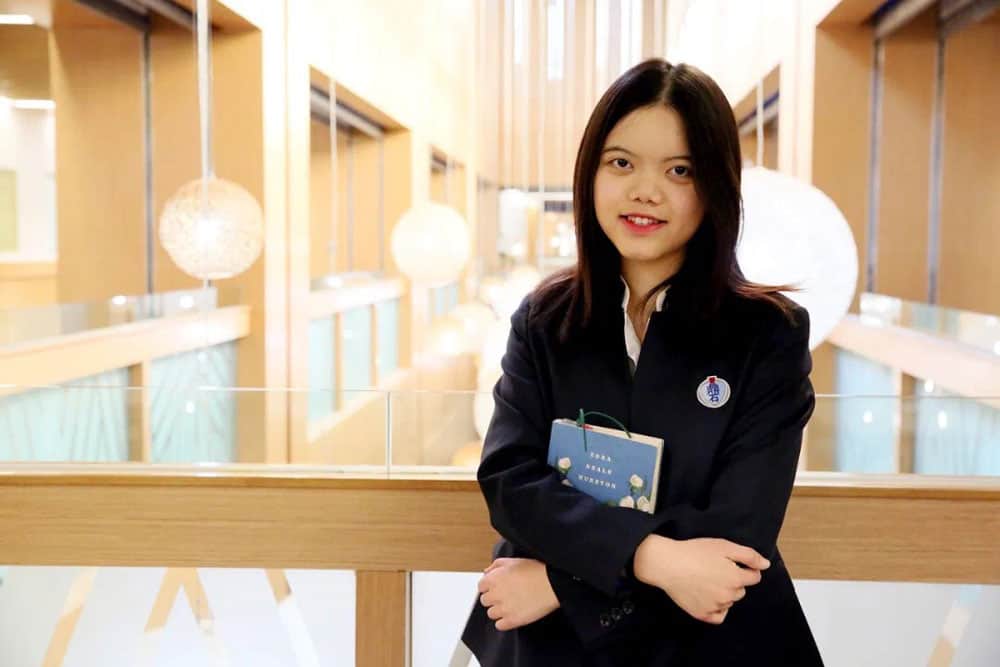
Loss for Words
Cady is in the middle of a class when a notification pops up—an email from her parents, telling her she has received an offer from Princeton University. Cady tries to contain her glee in three words: “Oh, okay! Cool!”
Cady has applied to several universities, including Princeton and the University of Cambridge, and has balked at the idea of going to a “chosen school”—what is sometimes called a dream school.
After the class, she goes straight to her college counselor Percy Jiang who rejoices too, as Princeton is the first offer that Cady has received. Soon after, she will get an offer from Cambridge.
“I have a school to go to now,” she says, and then grins. “I think I’m going to be happy at all the schools that I have applied to. I will be happy anywhere. Just like Keystone, I’m so happy here.”
Cady’s transfer to Keystone Academy was, in her words, a “random decision,” a process that neither she nor her family planned out. Although feeling content in her previous school, Cady says she wanted to try something new.
And at this time of writing, four years have gone by since that transfer and Cady has blossomed from being a timid girl to a confident and well-balanced young woman. She likes the variety of extracurricular offerings at Keystone, especially the activities that she is not good at.
In her previous schools, for example, she was never considered a sporty student; at Keystone, she is a competent but, in her words, a “terrible” squash player. Her foray into this sport, which started at an evening friendly with a boarder with whom she became friends, eventually led to a hobby that she has sometimes taken to a competitive level. She admits, though, that she gets beaten by younger players to the point that she has come to terms with losing. Cady is not quitting, however. She is resolute that she will win even if, as she says, this is “not by skill but by probability, if I keep on playing.”
This is the same determination that has fueled Cady’s pursuits in many fields, even if that means reading a book a couple of times just to decipher its author’s message.
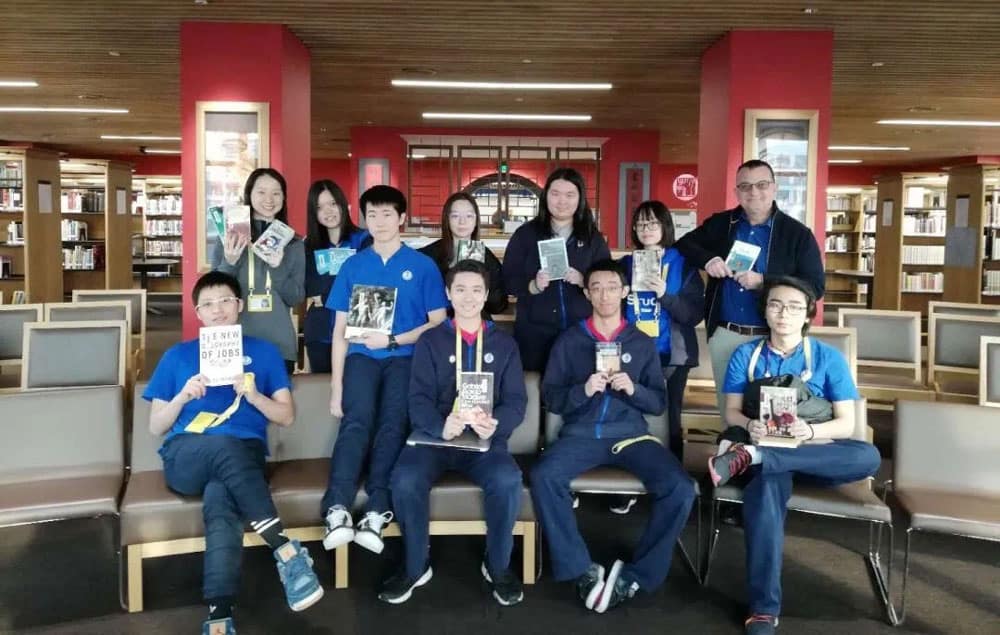
Cady is a self-confessed bookworm, devouring almost any read that’s on recommendation lists, especially if it has a good cover. “I know, don’t judge a book by its cover,” Cady gleefully exclaims, “But oh, The God of Small Things has a pretty cover!”
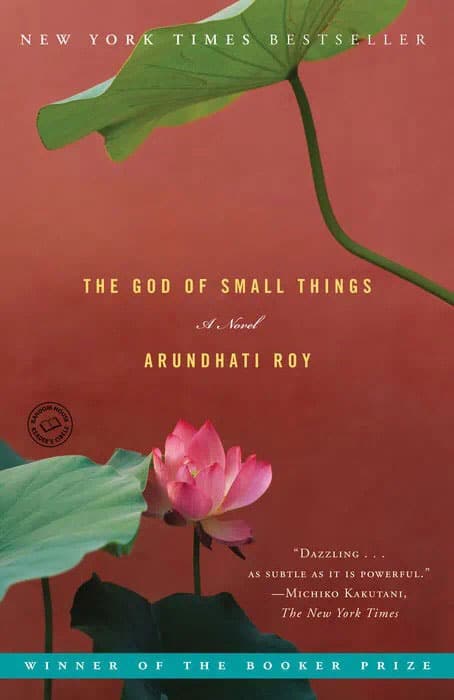
That book, the debut novel of Indian writer Arundhati Roy, harnesses the structure and conventions of language to depict the childhood struggles of a fraternal twin born in a rigid and harsh society. Cady goes on explaining for seven minutes, highlighting the parts that have intrigued her so much at first reading.
“For example,” Cady begins the sequence, “when the mother [of the protagonists] was very angry, she said, ‘You jolly well behave,’” and she continues straight, with suspense: “They thought, ‘Jolly Well is a deep well where people who misbehave go.’ Things like that. So, how children interpret reality, how they misunderstand the complexity of the world around them.”
Cady finds the narrative of The God of Small Things “complicated” as “so many things are happening all at once.” She even remembers her feeling after finishing The God of Small Things for the first time, although she doesn’t know how to describe it. The impact of the novel on her has been so immense that Cady dedicated a 4,000-word Extended Essay to it so that she can dig deep into Roy’s use of such nuances and “unconventional logic and wording.”
“I still love that book even after I wrote an essay on it,” she confesses, “so I think that means something—as most people wouldn’t feel that way after they spent months writing an essay about one book. I mean, I should be tired or sick of the book by that point, but I’m still not, which means that it must be really great.”
And that something is manifested clearly in her essay. One senses that it’s a labor of love and not an academic requirement. Her English teacher for two years and IB DP (Diploma Programme) Coordinator Rick Spadafora says Cady’s monograph is a “very advanced level analysis of a book,” and one of the most challenging topics he has encountered in his career. Mr. Spadafora says Cady has gone to great lengths to find evidence for and back up her research, resulting in a “university-level paper” with ideas “so fantastic and very rare.”
“She chose to write an essay about an English book, and she challenged herself and did it in English,” Mr. Spadafora remarks. “I was caught by surprise. I thought she would have chosen physics or math, because she’s very strong in those areas.”
Star Power: Blinding or Enlightening?
Teachers see Cady as the epitome of the well-balanced student: studious yet active, soft-spoken but confident. For her junior and senior years, Cady chose Higher Level Physics, Mathematics, and Chemistry courses—a rare combination in the IB curriculum. Cady also took on an advanced level Economics course.
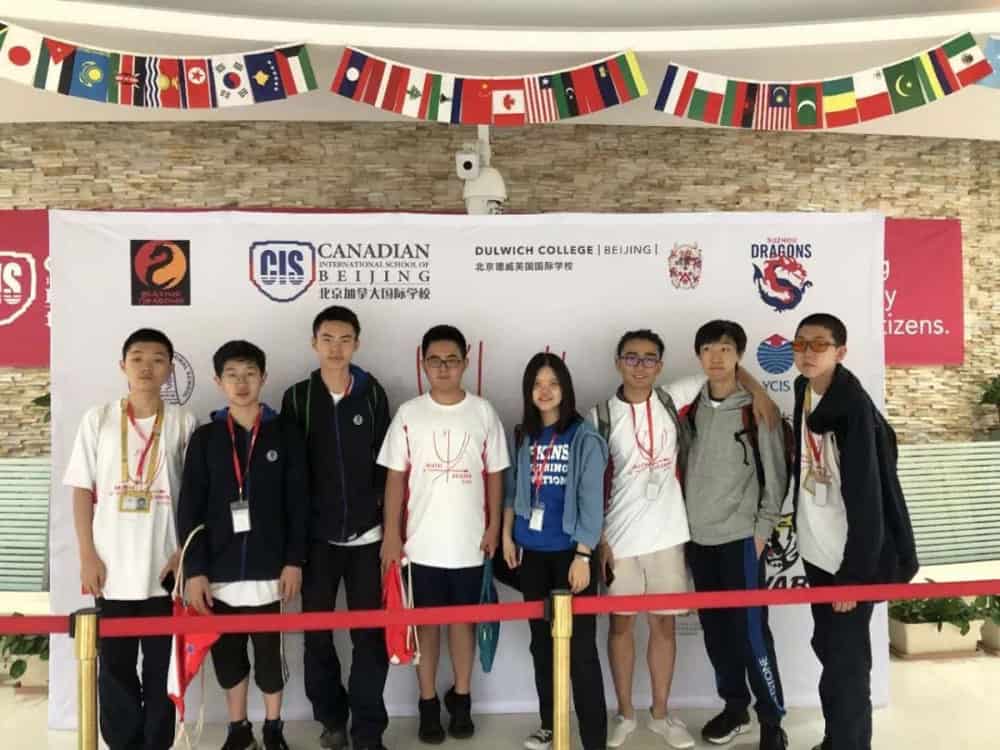
Outside Keystone, Cady is a formidable force in international competitions. In 2019, she topped the Math Olympiad of ACAMIS (the Association of China and Mongolia International Schools) and bagged the Global Excellence Award at the Canadian Physics Olympiad (CAP). The year prior, she was awarded the Global Silver Medal at the British Physics Olympiad (BPhO).
For two consecutive years, she was inducted into an elite group of high schoolers around the globe working with Pioneer Academics, a research program allowing select students to work on research papers together with experts. Among them was Emeritus Professor of Psychology George A. Gescheider from Hamilton College, who was Cady’s instructor for her paper on neurology. The professor commended her for an “outstanding performance comparable to what I have seen in the best undergraduate students in college for many years.”
These big words and recognition do not sway Cady; instead, she remains still and treads lightly as she seeks the concepts and principles behind the subjects she is studying. When she encounters confusion, she will try to find answers by herself until she gets through the bump. Her Chemistry teacher Ritah Mputhia says Cady even “walks in front of us,” assisting her peers who face learning obstacles on the way.
There are some, however, who are blinded by Cady’s brightness, even calling her a xueba or “academic overachiever” because of the high bar that she has set. But high school senior Frankie Fan thinks those people “ignore the hard work Cady has been doing,” saying that the xueba is just like them—she also gets extremely nervous when there is an exam and feels tired after a long day at school. “Cady is like a star that emits light,” Frankie says about her good friend. “A star needs a lot of energy to shine bright. And because Cady works so hard, she sometimes doesn’t even realize that she is twinkling.”
In the classroom, Cady may be a math wizard. But only a few know that she attains this excellence through spending afternoons reviewing lessons or using homework-less days to explore new knowledge. And when others stay up late chatting with friends, Cady will try experiments to test her research projects. She is always focused – her laptop doesn’t even have WeChat installed on it.
The way she manages her time is remarkable. Some people may think this life of order is devoid of fun; on the contrary, Cady is happy with what she does. She plays squash, dances ballet, and even joins yoga sessions with her teachers. And so, for people who see Cady as a xueba, they miss all the other aspects of her personality.
Cady’s firm understanding of herself releases her from the undue expectations of a society that puts too high a regard on people whose résumés glimmer with sensational achievements or spectacular pursuits.
“I work hard but I am not desperate,” she says. “Of course, I have my shortcomings, but I will not force myself to do things I do not like. And I am fortunate to be surrounded by good friends, so I feel no one needs to know me.”
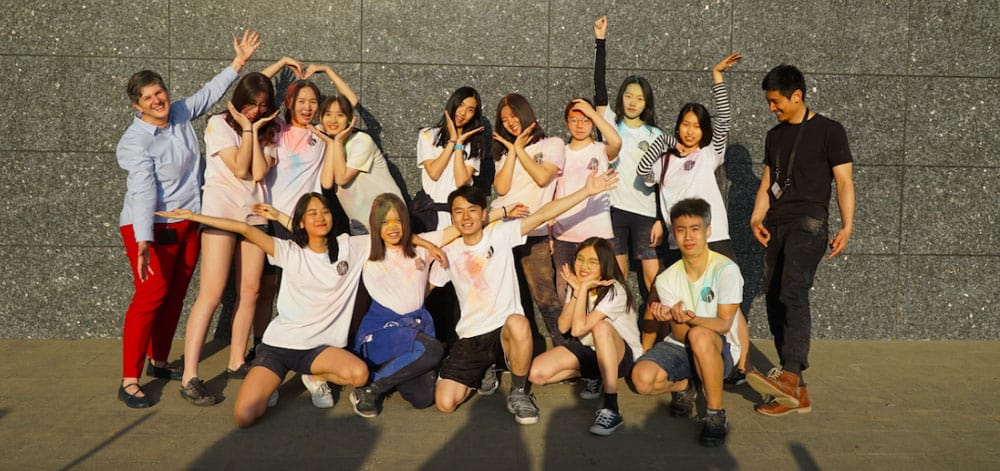
Getting into a “Good Inner State”
Cady remembers her participation in the Keystone United Nations (KUN) in her ninth grade, joining debates and writing resolutions. She prefers the latter, because she feels uncomfortable “intentionally picking arguments with people.” Debating takes her out of her comfort zone, and even if she has tried to step out of it in the past two years, she feels “miserable there every time,” especially when people quiz her to find faults in arguments.
She is aware, though, that debating develops the critical skill of reasoning for young people. So, what she does instead is to live by her family’s rule: “do not criticize others unless we can think of something better to say.” It came in handy when Cady was preparing for her Extended Essay and college application essays, because her parents gave constructive feedback on her drafts to make them more readable.
The Feng’s family rule is a refined version of the adage “learn from mistakes.” Cady recalls an incident at the end of the eleventh grade, when she felt so stressed that she vented to her parents. As most parents would do, Mr. and Mrs. Feng offered their daughter constructive advice; their daughter, however, was seeking a listening ear.
“That time, I felt more upset when they gave me advice,” Cady says, “And so, I called mom and said, ‘In the future, please just don’t do that anymore. Just listen.’” They agreed. And they have been doing that since then.
“One night when I was stressed, I Skyped my parents because I couldn’t seem to focus. I told them I needed someone to be there for me. And just like that, my mom remained on Skype while reading a book—we were not talking, but she was there… My parents are really sweet and when there are things that are not working, we try to figure out a solution together and learn together.”
Outside of the family, Cady says she is surrounded by “amazing friends” with whom she shares similar vibes and values despite coming from different backgrounds and having unrelated interests. What she knows for sure is that her friends are the people on whom she can depend. This environment allows Cady to be herself or, for her, to get into “a good inner state.”
“You don’t have to run all the way or shout your success. No matter what choice you make, do it because you are happy. Do not be swayed by the world, and instead, let your inner state—your heart—follow you for life.”
Growing Together
The Fengs may be welcoming another engineer in a few years’ time. Cady looks into following the lead of her dad but will focus on either electrical or mechanical engineering in the hope of building a project that will benefit people without harming the environment. As to what kind of project it will be, Cady says nothing concrete is in the pipeline yet. But an idea that has been flowing in her mind is a system that can power a remote village.

“I like the environment and I think it’s unfair that I have so many opportunities when other people don’t,” Cady says shyly and almost inaudibly. “I want to make their lives better. This makes me sound so ethical or moral, but I’m not like that,” she stresses with quiet conviction. “I want to do it for a reason. It feels the right thing to do.”
Cady references her childhood memories of her parents taking her out to nature as to why she is into environmental protection. She remembers an instance about how she would run around their community to find the largest pinecone and an anecdote about how she would collect used bottles and papers and sell them to a recycling shop to get an allowance, as her mom didn’t want her to do housework “that she was supposed to do” in exchange for money.
Mr. Feng says his daughter is truly considerate of other people’s feelings and innately curious, some traits he first noticed when the young Cady wondered how animals move and machinery operates. As an engineer himself, Mr. Feng responded to the queries of his daughter, as if he was giving a small lecture. In addition, he and his wife would read her books so she could find out more about how the world works. This sparked Cady’s interest to explore things, which was piqued further when she entered Keystone because of its different approach to learning and teaching.
Mr. Feng admits that he and his wife do not know much about what an IB (International Baccalaureate) class is like, other than that it seems more demanding and challenging than the differently structured pace of a public-school class. But when Cady reached out to him for her Extended Essay on the novel The God of Small Things, Mr. Feng told her, “No problem.” Cady, he says, has written book reviews in the past, so he believed she could take on that “big project.”
In the process, his daughter “worked so very hard that she closed her door for four days and stayed in her room to concentrate on writing,” Mr. Feng reveals. Once finished, she solicited the comments of her dad, who, unfortunately, has not read the novel yet.
“I told her to make sure that somebody who has not read the book could understand what she wrote, instead of going straight to statements because they may distract the readers,” Mr. Feng adds, saying Cady immediately got the message and adjusted the draft accordingly.
Mr. and Mrs. Feng understand the wide difference between the way they learned—because they “have to fight for their lives” back in the day—and their daughter’s “better situation” under the IB system and a Keystone education. This is why they want Cady to pursue whatever will make her happy, under one condition: that she should not stretch herself too much. Mr. Feng jokes that did not happen in Cady’s “ten tough months” dealing with college applications while still working very diligently at her academics. Mr. Feng also references the good time management habits and sense of academic responsibility that his wife has instilled in Cady. Keeping a planner and ticking off to-do lists give Cady a feeling of achievement every day. Meanwhile, working on assignments by herself has developed accountability and responsibility because it is “her task and not ours,” Mr. Feng says.
Despite all of this, Mr. Feng says there is nothing special in their parenting style, because “other families have been doing more for their children.” But what Mr. Feng is confident of is that they are growing with their daughter while acquiring new knowledge together, learning from each other’s mistakes, or following her progress—all to make sure they understand one another.
Keep on Moving
“Not worry too much. Nothing is too big of a deal.” That is Cady’s message to her future self, who will, we hope, stumble upon this piece long after she graduates from university. Surprisingly, the Cady of 2020, a girl with a jolly disposition and bright aura, is sometimes a worrier! Although she finds solace in the company of the good people surrounding her, Cady admits it is those things that she cannot control that concerns her.
Despite that, she has kept on moving. She did not know until the tenth grade that there is a powerful saying that captures that very action, attributed to Winston Churchill when he rallied his people to “never, never, never quit” by telling them this: “If you’re going through hell, keep going.”
Cady is aware she has not experienced that much, so that expression “just makes sense” in relation to what she has gone through, especially those times when she moves on deftly from the feeling of anxiety or of being overwhelmed.
“I will not be able to control certain things as I grow up. Because right now, in school, everything is structured. If I do something, I get a certain result in life. But it’s not going to be that way in the future. So, Cady, don’t worry about things you can’t control. Just keep going,” she tells herself.
We express our gratitude and appreciation to the following teachers who provided information and helped us complete this profile: Mr. Jonathan Burslem, Dr. Cos Fi, Dr. Diana Martelly, Dr. Maureen McCoy, Ms. Dorothy Mubweka, Mr. Aki Mustonen, Ms. Ritah Mputhia, Mr. Rick Spadafora.
Photos: Cady Feng





